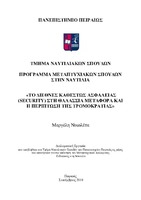Το διεθνές καθεστώς ασφάλειας (security) στη θαλάσσια μεταφορά και η περίπτωση της τρομοκρατίας
The international maritime security and the case of terrorism

View/
Keywords
Τρομοκρατία ; Κώδικας ISPS ; Σύμβαση SUA ; ΑσφάλειαAbstract
Terrorism is a phenomenon that concerns all states, governments and citizens worldwide. Following the terrorist attack of 11th September, it was necessary preventive measures to be taken and the global community establish rules at to ensure security. Given the fact that most of the world trade is done by the sea, maritime security was inevitable. A terrorist strike in the maritime area has enormous economic and environmental implications worldwide. All ships can be used as a mean of terrorist attack at any time and this is proven by past events. The legal framework on maritime security has been define by the Global Maritime Organization, the European Union, and the United Nations etc. The ISPS Code and the International Convention for the Suppression of Unlawful Acts in Navigation (SUA) are the two main texts for maritime security. The ISPS Code refers to the security rules for ships and port facilities with mandatory enforcement since 2004 while the International Convention for the Suppression of Unlawful Acts in Navigation (SUA) has been in force since 1980 when the concerns about illegal acts against the safety of ships have increased due to terrorism or piratical incidents and so on. In addition, the EU has issued Regulations and Directives where it adopts the above and contributes to enhancing safety on ships and port facilities.
The main consequence of Terrorism is the creation of a regime of fear and insecurity worldwide. Additionally, compliance with the rules by shipping companies, port facilities and states can be proven too costly.
Also, the measures and the way companies and organizations choose to comply with should take into account the human factor and try to simplify procedures

